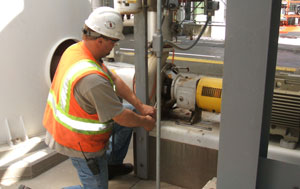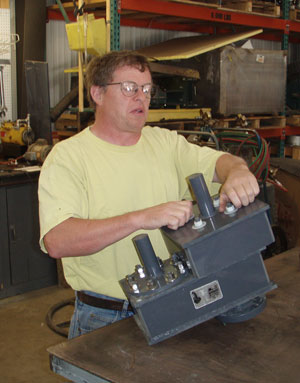Testing the Mettle of Maintenance





August 27, 2007
BY Bryan Sims
Imagine a person driving their vehicle home from work and getting a flat tire. A flat is clearly a problem that, with the right tools, can be fixed on the spot. What if the vehicle is equipped with a tire jack but no spare tire? For the driver it's a maddening situation that could easily have been prevented by checking to make sure the proper maintenance tools were in the trunk.
Maintaining an ethanol plant is a larger job than keeping a vehicle running, and when something goes wrong it's not only maddening but also time consuming and expensive. Problems are intensified when the proper tools and parts aren't available. The key to being prepared for any and all eventualities is inventory management, preventative measures and predictive maintenance. These are three important aspects of maintenance activity that plant managers, general managers and maintenance managers need to monitor on a daily basis so that malfunctions don't cause entire plant shutdowns.
"Predictive maintenance is becoming more and more important," says Scott Tostenson, maintenance manager at Chippewa Valley Ethanol Co. LLLP (CVEC) in Benson, Minn., a 45 MMgy ethanol plant. Tostenson and his staff account for about $800,000 worth of inventory at the plant.
Determining if a piece of equipment is critical to a plant while recording predictive and preventative information is paramount to achieving optimal performance and productivity within today's ethanol facilities, according to Kerby Todd, maintenance manager at U.S. Bio Albert City in Albert City, Iowa, a 100 MMgy plant. Todd, who worked in the airline business before starting his job at the ethanol facility in December 2006, knows the importance of preventative and predictive maintenance procedures to allay potential faults. "Identifying critical parts and preventing their malfunctions is almost a science in itself," he says.
Todd was one of three panelists who participated in the "Maintenance Matters" session at the 2007 International Fuel Ethanol Workshop & Expo in St. Louis, Mo., in June that targeted ethanol plant maintenance and the strategies that can be employed to make it more efficient. Plant managers and those interested in plant operations learned that investing in well-trained, experienced maintenance personnel to ensure maximum fluidity and plant success will increase plant reliability and up-time. Establishing a good maintenance crew is also essential to expanding the plant's lifespan. "We don't look at these plants as having a shelf life," says Bill Lee, CVEC general manager. "[Our view is] with proper maintenance these [plants] can maintain good productivity going forward."
To get optimal performance out of a plant, it's up to maintenance management—in conjunction with operations management—to guide and create a positive climate within the workplace.
Computer Assistance
Ethanol plant maintenance personnel would agree that one person alone cannot achieve the company's primary maintenance goals. Tracking and tracing parts, controlling inventory stock and maintaining preventative and predictive maintenance logs are just a few of the maintenance teams responsibilities. With so much activity to track and record, more maintenance managers are relying on computer software programs for assistance. Computerized Maintenance Management System (CMMS) software package can be useful for ensuring maintenance fluidity. A CMMS—sometimes called Enterprise Asset Management—offer significant improvements over spreadsheet, logbook or "yellow legal pad" approaches to documenting maintenance activity. Although paper-based methods are better than nothing at all, these long-standing practices lack the robustness required to truly modernize and optimize a plant's maintenance effort.
Joel Tesdall, president of Mapcon Technologies Inc. has seen the benefits of his CMMS over the past 25 years. Today, many ICM Inc.-built ethanol plants are utitizing Mapcon's line of software. Using computer maintenance software increases productivity and production capacity and reduces material and contractor costs, and down time. "The heart of it is controlling work flow so that you know what you have to do," Tesdall says. Today, about 40 ethanol plants incorporate Mapcon software programs into their operations. "If you don't have software to do that you're doing everything on paper," he says. "That might work out to start with but it's not going to make you very efficient." As an added service, Mapcon trains the personnel who will work with the software at the plant or at Mapcon's headquarters in Des Moines, Iowa, Tesdall says. Along with Mapcon, Datastream Inc.'s MaintainIt Pro and MP2 are other maintenance management tools available for ethanol plants.
Mapcon software programs specialize in several areas including: asset and work order history, work order documentation, preventative maintenance scheduling, labor time and cost, planning and scheduling, safety procedures, failure analysis, inventory control, project management, purchasing integration, and leak detection and repair tracking. Maintenance managers focus mainly on failure analysis, inventory control and refining predictive maintenance protocols. "Getting the programs up and running seems to be the challenge because transitioning from unscheduled outages to scheduled maintenance and using predictive maintenance is more of a challenge," Tostenson says.
Terry Flemming, maintenance manager for the Glacial Lakes Energy LLC plant in Watertown, S.D., knows the importance of inventory management. Having parts readily available when needed is crucial, especially in the midst of a plant expansion, going from 50 MMgy to 100 MMgy. With a bigger plant come more parts and equipment. "Usually, you try to make sure you have [a part] on hand before you tear into it," Flemming says. "As the plant gets older you have more spare parts on hand, you just try to keep the ones on hand you think you'll need. Sometimes you can borrow a part from another plant. That's why you keep good relationships with everyone."
Because maintenance managers are constantly updating preventative maintenance it's important to archive maintenance history for future reference. CMMS software packages provide the benefit of not having to manually input history reports. The programs also allow managers to call up that information when they need it—for a random audit, for instance. CMMSs are available with handheld devices or personal digital assistants (PDAs), which can come with Internet access and other functions such as Internet-based notifications, wireless work notifications and real-time data access to vendor reports.
In order to fully benefit from a CMMS and realize immediate results, all of the employees in the plant must commit to and know why they're using it. "The most important thing in my opinion is employee buy-in," Todd says. "If the maintenance technicians and the plant employees don't want to use the CMMS, you'll notice it right away, and it's something you don't want to see."
To get the most out of the software, Tesdall advises maintenance managers and personnel to thoroughly plan ahead and determine which functions fit which specific needs. Without proper planning the operator could be lost in the technology and thereby be set up for failure. "Before you go out and buy this [computer software] figure out exactly what you want to use it for," Tesdall stresses. "Figure out where your efficiency is going to come from and then ask the vendor, or ask us, how this can be accomplished?"
Reliability is Key
Steve Birtch, vice president of development for Permolex International, explained the importance of implementing a reliability program to ensure optimal performance within an ethanol facility. He defines a reliability program as "the creation of people and tools in order to elevate overall performance within maintenance activities." Various components come together when building a reliability program, however the fusion of people and tools is the prevailing driver, he says. "When I talk about reliability, I'm talking about the overall out-time of the facility, ensuring the plant is reliable and that it provides what is expected to the stakeholders and shareholders," Birtch says.
A professional engineer with 10 years of biofuels experience, Birtch outlined 11 aspects he believes are integral components in implementing an effective reliability program. They are:
› develop and obtain buy-in of goals and objectives
› establish a reliability function
› implement a thorough inspection program
› understand and control lubrication, contamination and looseness issues
› incorporate reliability into your capital program
› institutionalize root cause analysis (RCA)
› perform and respond to condition-based maintenance
› optimize spare parts
› maximize benefits of shut-downs
› establish a quality control program to fit into your overall maintenance and reliability program
› make it a team effort
"You're making an investment when you're focusing on reliability and the focus is mainly through tools and people," Birtch says. "It's not necessarily capital intensive, but it does result in good benefits." Implementing a reliability program entails a proactive approach by management as much as it does a reactive approach by subordinates, the maintenance team or the operations team. Establishing employee buy-in can be accomplished by using tactful communication strategies such as newsletters and meetings. "If you continually talk about reliability, more and more people in your plant will begin to talk the same way," Birtch says. "It's fun to begin to hear that positive attitude."
Birtch added that institutionalizing an RCA can benefit a successful reliability program if it's designed to meet its intended purpose. The purpose of an RCA is not to place blame but rather the antithesis, he says. RCA is an excellent tool to integrate into predictive maintenance activities and to prevent problems from recurring. Understanding why a particular part fails helps when it comes to finding solutions and preventing the part from failing again. "I really do believe that RCA is a key tool in a progressive facility," he said.
Inheriting a motivated, well-trained and experienced maintenance team is a luxury which can ultimately determine the success or failure of an ethanol plant. No matter how experienced a maintenance team is, they still need to have the proper tools in place to do their job.
"Maintenance is a liability," Todd says. "The maintenance department is really a liability instead of an asset because we cost the company money. Without us, their lost time and production would go down tremendously but you don't see that. Maintenance guys don't talk much. We just go out and get the job done."
Bryan Sims is an Ethanol Producer Magazine staff writer. Reach him at bsims@bbibiofuels.com or (701) 746-8385.
Maintaining an ethanol plant is a larger job than keeping a vehicle running, and when something goes wrong it's not only maddening but also time consuming and expensive. Problems are intensified when the proper tools and parts aren't available. The key to being prepared for any and all eventualities is inventory management, preventative measures and predictive maintenance. These are three important aspects of maintenance activity that plant managers, general managers and maintenance managers need to monitor on a daily basis so that malfunctions don't cause entire plant shutdowns.
"Predictive maintenance is becoming more and more important," says Scott Tostenson, maintenance manager at Chippewa Valley Ethanol Co. LLLP (CVEC) in Benson, Minn., a 45 MMgy ethanol plant. Tostenson and his staff account for about $800,000 worth of inventory at the plant.
Determining if a piece of equipment is critical to a plant while recording predictive and preventative information is paramount to achieving optimal performance and productivity within today's ethanol facilities, according to Kerby Todd, maintenance manager at U.S. Bio Albert City in Albert City, Iowa, a 100 MMgy plant. Todd, who worked in the airline business before starting his job at the ethanol facility in December 2006, knows the importance of preventative and predictive maintenance procedures to allay potential faults. "Identifying critical parts and preventing their malfunctions is almost a science in itself," he says.
Todd was one of three panelists who participated in the "Maintenance Matters" session at the 2007 International Fuel Ethanol Workshop & Expo in St. Louis, Mo., in June that targeted ethanol plant maintenance and the strategies that can be employed to make it more efficient. Plant managers and those interested in plant operations learned that investing in well-trained, experienced maintenance personnel to ensure maximum fluidity and plant success will increase plant reliability and up-time. Establishing a good maintenance crew is also essential to expanding the plant's lifespan. "We don't look at these plants as having a shelf life," says Bill Lee, CVEC general manager. "[Our view is] with proper maintenance these [plants] can maintain good productivity going forward."
To get optimal performance out of a plant, it's up to maintenance management—in conjunction with operations management—to guide and create a positive climate within the workplace.
Computer Assistance
Ethanol plant maintenance personnel would agree that one person alone cannot achieve the company's primary maintenance goals. Tracking and tracing parts, controlling inventory stock and maintaining preventative and predictive maintenance logs are just a few of the maintenance teams responsibilities. With so much activity to track and record, more maintenance managers are relying on computer software programs for assistance. Computerized Maintenance Management System (CMMS) software package can be useful for ensuring maintenance fluidity. A CMMS—sometimes called Enterprise Asset Management—offer significant improvements over spreadsheet, logbook or "yellow legal pad" approaches to documenting maintenance activity. Although paper-based methods are better than nothing at all, these long-standing practices lack the robustness required to truly modernize and optimize a plant's maintenance effort.
Joel Tesdall, president of Mapcon Technologies Inc. has seen the benefits of his CMMS over the past 25 years. Today, many ICM Inc.-built ethanol plants are utitizing Mapcon's line of software. Using computer maintenance software increases productivity and production capacity and reduces material and contractor costs, and down time. "The heart of it is controlling work flow so that you know what you have to do," Tesdall says. Today, about 40 ethanol plants incorporate Mapcon software programs into their operations. "If you don't have software to do that you're doing everything on paper," he says. "That might work out to start with but it's not going to make you very efficient." As an added service, Mapcon trains the personnel who will work with the software at the plant or at Mapcon's headquarters in Des Moines, Iowa, Tesdall says. Along with Mapcon, Datastream Inc.'s MaintainIt Pro and MP2 are other maintenance management tools available for ethanol plants.
Mapcon software programs specialize in several areas including: asset and work order history, work order documentation, preventative maintenance scheduling, labor time and cost, planning and scheduling, safety procedures, failure analysis, inventory control, project management, purchasing integration, and leak detection and repair tracking. Maintenance managers focus mainly on failure analysis, inventory control and refining predictive maintenance protocols. "Getting the programs up and running seems to be the challenge because transitioning from unscheduled outages to scheduled maintenance and using predictive maintenance is more of a challenge," Tostenson says.
Terry Flemming, maintenance manager for the Glacial Lakes Energy LLC plant in Watertown, S.D., knows the importance of inventory management. Having parts readily available when needed is crucial, especially in the midst of a plant expansion, going from 50 MMgy to 100 MMgy. With a bigger plant come more parts and equipment. "Usually, you try to make sure you have [a part] on hand before you tear into it," Flemming says. "As the plant gets older you have more spare parts on hand, you just try to keep the ones on hand you think you'll need. Sometimes you can borrow a part from another plant. That's why you keep good relationships with everyone."
Because maintenance managers are constantly updating preventative maintenance it's important to archive maintenance history for future reference. CMMS software packages provide the benefit of not having to manually input history reports. The programs also allow managers to call up that information when they need it—for a random audit, for instance. CMMSs are available with handheld devices or personal digital assistants (PDAs), which can come with Internet access and other functions such as Internet-based notifications, wireless work notifications and real-time data access to vendor reports.
In order to fully benefit from a CMMS and realize immediate results, all of the employees in the plant must commit to and know why they're using it. "The most important thing in my opinion is employee buy-in," Todd says. "If the maintenance technicians and the plant employees don't want to use the CMMS, you'll notice it right away, and it's something you don't want to see."
To get the most out of the software, Tesdall advises maintenance managers and personnel to thoroughly plan ahead and determine which functions fit which specific needs. Without proper planning the operator could be lost in the technology and thereby be set up for failure. "Before you go out and buy this [computer software] figure out exactly what you want to use it for," Tesdall stresses. "Figure out where your efficiency is going to come from and then ask the vendor, or ask us, how this can be accomplished?"
Reliability is Key
Steve Birtch, vice president of development for Permolex International, explained the importance of implementing a reliability program to ensure optimal performance within an ethanol facility. He defines a reliability program as "the creation of people and tools in order to elevate overall performance within maintenance activities." Various components come together when building a reliability program, however the fusion of people and tools is the prevailing driver, he says. "When I talk about reliability, I'm talking about the overall out-time of the facility, ensuring the plant is reliable and that it provides what is expected to the stakeholders and shareholders," Birtch says.
A professional engineer with 10 years of biofuels experience, Birtch outlined 11 aspects he believes are integral components in implementing an effective reliability program. They are:
› develop and obtain buy-in of goals and objectives
› establish a reliability function
› implement a thorough inspection program
› understand and control lubrication, contamination and looseness issues
› incorporate reliability into your capital program
› institutionalize root cause analysis (RCA)
› perform and respond to condition-based maintenance
› optimize spare parts
› maximize benefits of shut-downs
› establish a quality control program to fit into your overall maintenance and reliability program
› make it a team effort
"You're making an investment when you're focusing on reliability and the focus is mainly through tools and people," Birtch says. "It's not necessarily capital intensive, but it does result in good benefits." Implementing a reliability program entails a proactive approach by management as much as it does a reactive approach by subordinates, the maintenance team or the operations team. Establishing employee buy-in can be accomplished by using tactful communication strategies such as newsletters and meetings. "If you continually talk about reliability, more and more people in your plant will begin to talk the same way," Birtch says. "It's fun to begin to hear that positive attitude."
Birtch added that institutionalizing an RCA can benefit a successful reliability program if it's designed to meet its intended purpose. The purpose of an RCA is not to place blame but rather the antithesis, he says. RCA is an excellent tool to integrate into predictive maintenance activities and to prevent problems from recurring. Understanding why a particular part fails helps when it comes to finding solutions and preventing the part from failing again. "I really do believe that RCA is a key tool in a progressive facility," he said.
Inheriting a motivated, well-trained and experienced maintenance team is a luxury which can ultimately determine the success or failure of an ethanol plant. No matter how experienced a maintenance team is, they still need to have the proper tools in place to do their job.
"Maintenance is a liability," Todd says. "The maintenance department is really a liability instead of an asset because we cost the company money. Without us, their lost time and production would go down tremendously but you don't see that. Maintenance guys don't talk much. We just go out and get the job done."
Bryan Sims is an Ethanol Producer Magazine staff writer. Reach him at bsims@bbibiofuels.com or (701) 746-8385.
Advertisement
Advertisement
Upcoming Events





